|
|
|
Sort Order |
|
|
|
Items / Page
|
|
|
|
|
|
|
| Srl | Item |
| 1 |
ID:
135234
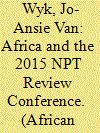

|
|
|
|
|
| Summary/Abstract |
African states' attendance at and participation in the preparations for the 2015 Review Conference of the Parties to the Treaty on the Non-proliferation of Nuclear Weapons (NPT) has produced mixed results, with the continent acting as both agent and bystander in respect of certain issues. African agency is evident in, for example, its position as a member of groupings on Iran's nuclear weapons programme and the Middle East Nuclear Weapons Free Zone. Less agency is evident in states' individual actions. This underscores the importance of African states' preference for multilateralism. However, African agency is also less evident in African multilateral efforts at the NPT preparatory meetings. The impact of these developments on the 2015 NPT Review Conference is too soon to tell but may bode ill for African agency.
|
|
|
|
|
|
|
|
|
|
|
|
|
|
|
|
| 2 |
ID:
135242
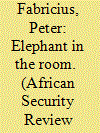

|
|
|
|
|
| Summary/Abstract |
When United States (US) President Barack Obama announced in 2013 that he would host the first United States-Africa leaders' summit the next year, he was greeted with considerable scepticism. Many critics thought he was just playing catch-up with other countries and organisations which had been holding Africa summits for years, especially China. But, whatever the motives, the event itself proved to be a substantial success, probably re-setting US relations with Africa for many years to come.
|
|
|
|
|
|
|
|
|
|
|
|
|
|
|
|
| 3 |
ID:
135241
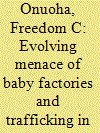

|
|
|
|
|
| Summary/Abstract |
Trafficking in persons in Nigeria has largely targeted adults and children, particularly women and girls. Of growing concern, however, is the recent emergence and growth of sophisticated and syndicated groups involved in baby ‘factories’ and trafficking in Nigeria. This article examines the nature, actors, modus operandi and motives behind this emergent dimension of human trafficking in Nigeria. It concludes that if concerted efforts are not made to deal with the actors and dismantle the market, its profitability will embolden current actors and even encourage new entrants into the booming trade – now and in the future.
|
|
|
|
|
|
|
|
|
|
|
|
|
|
|
|
| 4 |
ID:
135231
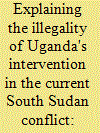

|
|
|
| 5 |
ID:
135232
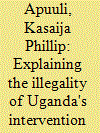

|
|
|
|
|
| Summary/Abstract |
During the night of 15 December 2013, fighting broke out between factions of the Sudan People's Liberation Army (SPLA) in Juba, the capital of the Republic of South Sudan. The fighting pitted forces loyal to President Salva Kiir against those loyal to former Vice President Riek Machar. Five days later, Uganda sent troops into South Sudan, advancing a number of reasons for intervention, including that it had been invited by the legitimate government of South Sudan to ensure order; it needed to evacuate Ugandan citizens caught up in the fighting; it had been asked by the United Nations Secretary-General to intervene; and that the regional organisation, the Intergovernmental Authority on Development had sanctioned the intervention. As the conflict escalated, Ugandan troops started fighting on the side of forces loyal to Kiir. The underlying reasons for the intervention were clearly economic, but those advanced were legal. This article discusses both sets of reasons and concludes that the economic reasons are more persuasive. Nevertheless, while some of the legal arguments (such as being invited by the legitimate government of South Sudan) can be asserted, others are clearly dubious. In addition, the participation of Ugandan troops in the fighting on the side of the Kiir government renders the intervention illegal.
|
|
|
|
|
|
|
|
|
|
|
|
|
|
|
|
| 6 |
ID:
135233
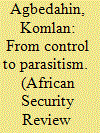

|
|
|
|
|
| Summary/Abstract |
This article sets out to investigate the current paradoxical roles of border control agencies in order to contribute to the theoretical debate on border porosity and related security issues in West Africa. The colonial demarcation of African borders accounts for their porous nature initially, as borderland populations challenged the unjust scission of their cultural, economic, geographical and geopolitical spaces. However, new forms of porosity also evolved over time, masterminded by new actors. Drawing on the Ghana–Togo border case, and through interviews, observation and documentary analysis, this article argues that border control agencies are partly responsible for the current border porosity and attendant security problems as their jurisdiction has shifted to a multi-layered border parasitism. The article is not, however, an attack on border law enforcement agencies; rather it attempts to explore their roles in shielding the region, already exposed to terrorism and piracy, from further security threats.
|
|
|
|
|
|
|
|
|
|
|
|
|
|
|
|
| 7 |
ID:
135230
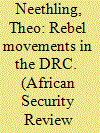

|
|
|
|
|
| Summary/Abstract |
Despite a generally valiant effort on the part of the United Nations (UN) since 1999 to bring peace and stability to the Democratic Republic of the Congo (DRC), the country continues to be destabilised by rebel forces. These armed movements pose a constant threat to the fragile transition in the DRC, and security in the country is continuously undermined. This article examines rebel forces in the DRC from two perspectives. Firstly, it examines such movements as a manifestation of sub-national terrorism. Secondly, it examines armed movements from the perspective of so-called ‘ungoverned spaces’. The view taken in this article supports the scholarly insight and argument that in countries such as the DRC, armed movements and militias are filling power vacuums that are the result of the inability and lack of military capacity of weak states to fight these movements effectively. Specifically, the eastern and north-eastern parts of the DRC have been major conflict zones where sub-national terrorists employ terror as a strategy. In this context, the DRC is severely affected by terrorism – a phenomenon in the DRC that is intimately linked to the failure to effect sustained development and to consolidate accountable and effective governance.
|
|
|
|
|
|
|
|
|
|
|
|
|
|
|
|
| 8 |
ID:
135229
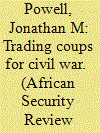

|
|
|
|
|
| Summary/Abstract |
This paper investigates civil conflict as a product of the survival strategies of African leaders. Specifically, the paper offers a theory of risk substitution that predicts coup-fearing leaders will undermine the military effectiveness of the state when making an effort to extend their own tenure. While ‘coup-proofing’ practices have often been noted as contributors to political survival, considerably less attention has been paid to the influence of these strategies on other forms of conflict. Utilising data from a number of cross-national datasets, the analyses show that having a higher number of ‘coup-proofing’ counterweights significantly worsens a state's civil conflict prospects. A brief consideration of multiple episodes of conflict further suggests that in addition to coup-proofing undermining the counterinsurgency capacity of the state, some leaders are simply indifferent to – or can even potentially benefit from – the existence of an insurgency.
|
|
|
|
|
|
|
|
|
|
|
|
|
|
|
|
| 9 |
ID:
135235
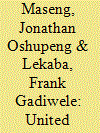

|
|
|
|
|
| Summary/Abstract |
This article analyses the disunity among African states in terms of United Nations Security Council (UNSC) reform, and attributes it to the contest between South Africa and Nigeria. These two countries have been locked in a hegemonic contest for continental domination. To this end, the article notes that African unity, not in terms of protocol but on the basis of principles and cooperation, is sacrosanct in order for the African Union to make a significant contribution to the reform of the UNSC. It is asserted that the contest between South Africa and Nigeria has been symbolised by the continental leadership aspirations of the heads of state of both countries, and recommends that it be tamed through forging diplomatic and strategic partnerships between the ruling parties of these two countries. The influence of external actors on the African countries, particularly that of France, is underscored as a contributing factor in stalling the debate on the UNSC reform. It recommends that South Africa use its strategic partnership within the association of Brazil, Russia, India, China and South Africa (BRICS), particularly Russia and China as permanent members of the UNSC, to influence the realisation of the reform debate.
|
|
|
|
|
|
|
|
|
|
|
|
|
|
|
|
|
|
|
|
|